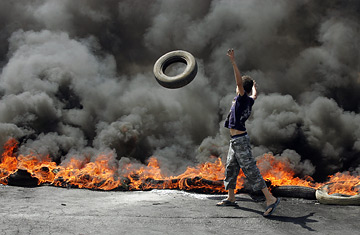
A Palestinian youth burns tires at the entrance of the Palestinian refugee camp adjacent to the besieged Nahr al-Bared camp in north Lebanon to protest against the continued attack by Lebanese army against the Islamic militants of Fatah al-Islam, May 2007.
"The camp is devastated. It stinks of bodies under the rubble. There are many dead," cried Mouein Safadi, 35, trembling with fatigue and emotion as he reached the first Lebanese army position some 200 yards from the edge of the camp.
"There are tens of wounded, but nobody can reach them," said Nora Abdel-Wahad, a 51-year-old mother. "There's no water, no food. We have lived three days with no electricity."
The exodus of refugees from this seaside camp, home to 40,000 people, was spurred by a temporary cease-fire Tuesday afternoon. The cease-fire was arranged to allow a convoy of six United Nations trucks to enter the camp to deliver food, water and medical supplies. But the convoy was struck by several mortar rounds while unloading its emergency provisions. Although none of the crew were harmed, three vehicles were damaged and had to be abandoned. The U.N. said it was unsure whether the mortar fire was from the Lebanese army ringing the camp or from the Fatah al-Islam militants holed up inside. But the drivers of the trucks said they were sure it was Fatah al-Islam.
"They waited for us to stop then they opened fire. They are shooting at anything that moves inside the camp," said Ahmad, one of the truck drivers, who refused to give his full name.
Mustafa, a Palestinian employee of the U.N. agency responsible for refugees, had found himself trapped in the camp when fighting broke out. He said that the Fatah al-Islam militants were forcing people to remain in the camp by shooting at anyone attempting to flee. The one tiny medical clinic in the camp was completely overwhelmed with casualties, he said. "The wounded cannot move anywhere. If they can't reach medical help, they die," he explained, adding that he and his colleagues were forced to amputate the hand of a wounded man themselves.
The brief lull allowed some of the Lebanese soldiers surrounding Nahr al-Bared a chance to rest after three days of tension and fighting. "They are a very tough enemy. They don't surrender. They will all fight to the end," said one special forces soldier, sitting beside a foxhole smoking a cigarette. Several other exhausted and bleary-eyed soldiers sat in silence smoking in the garden of a small mosque that had been requisitioned by the army as a fighting position. From the back of the mosque the smoking ruins of the camp's first buildings lay only 200 yards away on the other side of a dense orchard of orange trees.
A bareheaded major sat on a stool among his soldiers, two constantly ringing cellphones and a walkie-talkie before him. He apologized for refusing to discuss the fighting with his visitors and instead handed out fragrant gardenia blooms plucked from the mosque's garden. Sitting among the soldiers were several civilians wearing bandoliers of ammunition and carrying a variety of automatic rifles. They were local Lebanese villagers, many of them ex-militiamen from Lebanon's 16-year civil war, who had volunteered to fight the militants alongside the army. "No sleep for three days," said one militiaman with a grim smile.
The Lebanese government has said it intends to finish off Fatah al-Islam once and for all, and the soldiers expect the battle to intensify once the open-ended cease-fire ends, as they believe it inevitably will. Long after sundown, vehicles carrying refugees were still exiting from the camp. But heading in the other direction toward the frontline Lebanese army positions were columns of armored personnel carriers filled with fresh troops in preparation for what could be the climax of the battle in the coming hours and days.
